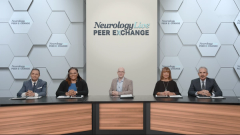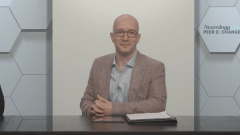
Key Points for the Management of Multiple Sclerosis
Stephen Krieger, MD; Daniel Bandari, MD, MS; Bruce Hughes, MD; Mitzi Williams, MD; and Heidi Crayton, MD, provide key takeaways for the treatment of patients with multiple sclerosis.
Episodes in this series

Stephen Krieger, MD: Well, speaking of key points coming from you, I want to come around and ask you each for a takeaway, a key point, either from ECTRIMS [European Committee for Treatment and Research in Multiple Sclerosis annual meeting] or just something that you were thinking about at this point, fall of 2022, in MS [multiple sclerosis] care. Dr Hughes, do you want to go first and give a closing takeaway point?
Bruce Hughes, MD: Sure. I think nothing beats face-to-face meetings. And the exchange of information, for me at least is infinitely greater than having to do it on computer screens. And I look at this information and I think multiple sclerosis is the envy of a lot of neurology in that 1 of the neurologists in my practice, who does not specialize in multiple sclerosis, referred to the rapidity with which new information and discoveries are coming out in MS. Trying to keep up with that is like drinking from a fire hose. And I say bring it on.
Stephen Krieger, MD: Dr Crayton.
Heidi Crayton, MD: I have to echo that. There’s nothing like in-person interaction with colleagues and being able to gain from that. We are humans and humans need connection. And I think we’ve definitely seen that this week. I think in terms of MS information, we’re learning more and more how to personalize and tailor therapy to the individual patient and their needs, which is also a moving target and in a state of flux. And I think that’s empowering for us to be able to have a little bit more control over personalizing a treatment plan.
Stephen Krieger, MD: I think you’re quite right. One of the themes at MS conferences this year, and for the next couple of years, is what the next generation of MS treatments looks like. There’s a lot of talk about a class of medicines called BTK [Bruton tyrosine kinase] inhibitors. They exist in the world. They are not used in treating multiple sclerosis yet. I think they’re probably 3 or 4 years in the future because the trials are running.
One thing I’ve been saying to my patients is we’ve got this rich armamentarium of treatments to allow us to personalize our choices. This is what we’re going to have for the next 3 or 4 years. So don’t wait for something in the future. At this point, let’s do the best personalized treatment and choices with the agents we have now. But murmuring in the background suggests that there’s another class of medicines that are going to emerge in a few years, and hopefully I’ll be back here with all of you at that point to talk about it. But for now, Dr Williams, your 2022 takeaways?
Mitzi Williams, MD: Yes, I think this is a really exciting time to be in the field of MS. One of the reasons I became an MS specialist is because I really felt like we were going to be on the cutting-edge of medicine and see so much change during the course of my career. And I’m seeing that. I’m very excited about some of the work that’s being done in underserved populations. There are some findings reported from the CHIMES trial during the ECTRIMS annual meeting about some of the baseline data. It’s a trial that’s focused on Black and Hispanic patients with multiple sclerosis. And there also are data presented from the Kenyan cohort, which is the largest group of Black African patients in a clinical trial in multiple sclerosis. So, I’m really excited about that, and likewise underrepresented populations, including our pregnant patients. I’m very excited about the data that are coming so that we can better treat that population as well.
Stephen Krieger, MD: Beautiful. Thank you. Dr Bandari, you get the last word.
Daniel Bandari, MD, MS: Absolutely. The evolution that we started years ago, looking at the disease for which we never thought there was going to be any treatment available, that we still don’t know whether there’s a cure for or not, has continued. 2022 was probably one of the exciting years because of the fact that we were able to look at the future of MS a little bit. You mentioned BTKIs [BTK inhibitors], which of course we’re very excited about. But at the same time, we’re looking at some of the biomarkers that would allow us to be able to not only give prognostic factors but predict, on some levels, what we are going to do for these patients. And of course, I’m extremely excited, but even post BTKI, looking at some neurodegenerative elements that we are going to be having. Because at the end of the day, no matter how much we want to halt and control and box the disease, we’re not repairing it. And my hope is that we’re going to be able to continue looking at neurotrophin factors and neurodegenerative elements of MS a little bit more intensely. And of course, looking at some of these new generations of molecules that we have, including ponesimod and including BTKIs, we might be able to find some of the hidden treasures within them that would allow the patients to be able to not only control their disease, but we might be able to get some reversality into that.
Stephen Krieger, MD: Beautiful. Well, what better note to end on than searching for the hidden treasures of MS treatment and protecting the lives and well-being of our patients. I want to thank our wonderful panel, and I want to thank all of you for watching. We hope you found this NeurologyLive® Peer Exchange discussion to be useful and informative. If you enjoyed the content, please subscribe to the e-newsletter. You can receive upcoming peer exchange updates and other great content in your inbox. Thank you all for watching.
Transcript edited for clarity
Newsletter
Keep your finger on the pulse of neurology—subscribe to NeurologyLive for expert interviews, new data, and breakthrough treatment updates.














